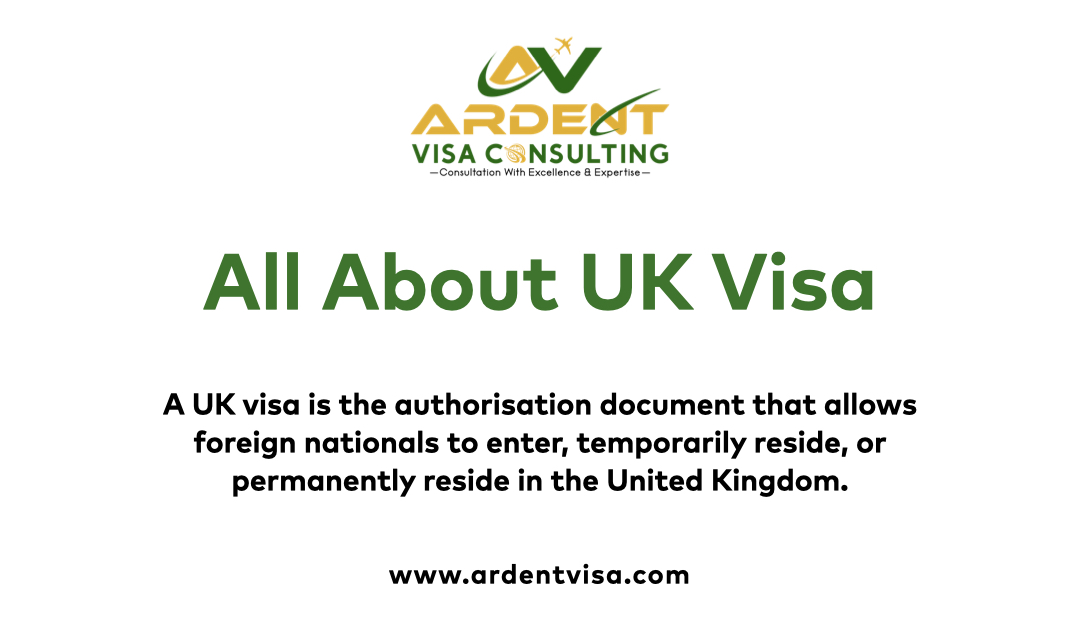The authorisation form that grants foreign nationals permission to enter the UK’s territory, remain there temporarily or remain there permanently is known as a UK visa. A visa is often either a document provided by a UK consulate or embassy in your county of residency or a stamp you receive in your passport.
If you receive a visa, it indicates that you are qualified to enter the UK and that you satisfy the conditions of the specific visa you were granted. There are numerous motives for wanting to register for a UK visa, including:
- To join relatives who are currently in the UK
- To work and conduct business
- To study
- For brief visits and tourism
- To transit via the UK to another nation To live continuously
- to be a refugee
- to require humanitarian protection
- to be stateless
- to require authorization to remain
How to Apply for a UK Visa?
The type of visa you are seeking has a big impact on how to apply for a UK visa. Particularly if your visa type falls under the points-based system category. Although the majority of the criteria are the same for each group, there are differences in how they are assessed by the system. Additionally, there are different extra requirements for each group.
When Should I Apply for a UK Visa?
Three months before the date of your anticipated travel is the earliest you can register for a UK visa. However, bear in mind that it could take up to three weeks for your visa application to be processed. Apply well in advance to give the consulate ample time to complete your visa.
What are the Required Documents for UK Visa?
Every applicant must meet a few prerequisites in order to apply for a UK visa. Depending on the type of visa and the applicant’s country of origin, these requirements change.
What is the Points-Based System (PBS)?
The United Kingdom’s Point-Based System (PBS) To control immigration to the United Kingdom from outside, visas were introduced as a replacement for the previous, considerably more complicated and difficult-to-understand system.
The PBS system rates candidates for visas according to the points they can earn by fulfilling visa requirements. Each travel document has a set amount of points, which the applicant must reach in order to be granted a visa.
UK Visa Types
The desire to register for a UK visa can be motivated by a variety of factors. Because of this, the United Kingdom has a well-organized system of visas based on the different sorts of visitors and their intended purposes.
Here are the UK visa types:
- Work Visas.
- Business Visas.
- Study Visas.
- Visitor Visas.
- Family Visas.
- Settlement Visas.
- Transit Visas.
Work and Business Visas
The UK offers Working Visas specifically for high-end professionals from other countries who seek to work and reside in the UK for longer or shorter periods in addition to its severe regulations, which prevent many visa holders from getting a job.
Categories of work and business visas
- Highly qualified foreigners:
- Global Talent Visa
- Skilled foreign workers with a job offer in a shortage area
- Tier 2 (General) Visa
- Tier 2 (Intra-company Transfer) Visa
- Tier 2 (Sportsperson) Visa
- Tier 2 (Minister of Religion) Visa
- Youth mobility and temporary foreign workers
- Tier 5 (Temporary Worker) Visa
- Tier 5 (Youth Mobility Scheme) Visa
- Other:
- Croatian National Registration Certificate
- Domestic Workers in a Private Household Visa
- Exempt Vignette Visa
- Turkish Worker Visa
The UK Business Visa types are the following:
- Tier 1 Entrepreneur Visa
- Tier 1 Graduate Entrepreneur Visa
- Tier 1 Investor Visa
- Turkish Businessperson Visa
Student Visas
International students who wish to pursue academic studies in the UK are granted several types of visas.
Categories of student visas
- Tier 4 (Child) Student Visa
- Tier 4 (General) Student Visa
- Short Term Study Visa
Tourist and Visiting visas
For shorter and even longer stays, the UK is a particularly popular tourist destination. The United Kingdom issues visitor visas for transitory stays, vacations and similar events. Rarely do UK officials grant a tourist visa for a duration greater than six months. Similar to many other categories, this form of visa does not allow foreign nationals to work in the UK.
Short business trips are handled kind of the same way.
Categories tourist and visiting visas
- Marriage Visitor Visa
- Parent of Tier 4 (Child) Student Visa
- Permitted Paid Engagement Visa
- Short-term Study Visa
- UK Visitor Visa
- Visa for a Chinese Tour Group
Family Visas
To visit family in the UK, a UK family visa is provided. This sort of visa is for those who wish to join their dependent family members who are employed and residing in the UK for a period of time greater than six months. The dependents can include children, parents, other family members, the spouse (husband or wife), partner, fiancé, fiancée or intended civil partner.
Categories of family visas
- UK Spouse visa
- UK Parent visa
- UK Child visa
Transit Visas
The UK Transit Visa is for foreign nationals who use the UK as a transit country to travel from one country to their destination but are not citizens of the EEA (EU nations, including Iceland, Liechtenstein and Norway) or Switzerland. If the applicant has sufficient proof that he must frequently travel via the UK in order to reach his goal but has no intention of staying or relocating there permanently, this visa offers the chance to register for a long-term transit visa. These lengthy transit permits can range in length from one to ten years.
Categories of transit visas
- For people who must switch planes while in the UK but do not want to leave the airport, there is the Direct Airside Transit Visa (DATV).
- For tourists who must leave the airport and use another mode of transportation as part of their journey through the country, there is the Visitor in Transit Visa. This visa has a maximum 4-day validity period.
Refugee Visa
People who intend to enter the UK and are at the border because they had to flee their country because their life was significantly threatened are eligible for a temporary refugee visa. This visa application is submitted from the UK.
The visa is only valid while the holder is still in danger and cannot leave the country. Foreign nationals who reside in the UK but have no other nationality are eligible for a Visa for Stateless Persons. This visa may be extended for a further two to six years.
UK Residence Permits
Indefinite Leave to Remain
The UK Settlement permit, also known as Innominate Leave to Remain is for people who have lived in the UK for a considerable amount of time on a temporary visa and are now hoping to be granted a permanent one. The visa is available to those who have lived abroad for at least two years and wish to return or whose passport has been lost.
Individuals from outside the UK who already have refugee or humanitarian category there and wish to remain there permanently or to reunite with family. The majority of these visas have requirements that the applicant must have spent at least five years in the UK.
EEA Residence Permits
EEA Residence Permits:
- EEA Residence Card
- UK Registration Certificate – EEA (QP)
- UK Permanent Residence Card – EEA (PR)
- EEA family permit related to the derivative right of residence
- EEA family permit related to the Surinder Singh
- EEA family permit related to retained rights of residence
- Certificate of entitlement for right to abode in the UK
Other Residence Permits
UK Residence permits serve to gain temporary residence in the UK.
Categories
- Returning Resident Visa
- Biometric Residence Permit (BRP)
- Residence Permit for Commonwealth Citizens
- Settlement visa as a Refugee or for Humanitarian Protection
Electronic Visa Waiver
For nationals of Kuwait, Oman, Qatar and the United Arab Emirati who wish to visit the UK for up to six months in order to conduct business, travel, study or receive medical treatment, the Digital Visa Waiver programme has been developed.
If citizens of these nations want to visit the UK for extended lengths of time or for other purposes, they must apply for different sorts of visas.
How to apply for Electronic Visa Waiver?
You must complete the online application first. You can register for this visa up to three months in advance of the trip and no later than two days prior to departure. Dependents cannot be added to this visa. Each person must apply separately.
It is simple to register for this visa and all that is needed is the information shown below:
- Passport details
- The address of the candidate’s residence in the UK
- A travel itinerary with anticipated dates of arrival and departure
Note: The candidate must pay £15 (~1400 INR)to apply for this visa.
When necessary, it is possible to alter the information on this visa, including the airport, train station, bus stop or other relevant locations, the time of entry into the UK and other relevant details.
After submitting the application, the candidate will receive a link with instructions on how to download the visa in one day. As a result, it needs to be printed and presented at the UK border.
What a UK Visa holder must know?
Even if a foreigner has a visa, they may still be subject to the control of immigration (examination) whenever they pass the UK border. The visa may also be revoked at the border in some circumstances.
It is unlawful to overstay your visa or violate its terms, whether you are inside or outside of the UK.
Visas offer the needed answers on:
- Who should be allowed to enter the UK and why?
- Who should be permitted to live in the UK permanently and why?
- Who qualifies and who should be barred from entering the UK?
- Who needs to leave the UK, whether it’s due to a visa expiration or another cause?
Visas sometimes can forbid the holder from doing several activities such as:
- Using public funding, obtaining employment or engaging in any other professional role in the UK
- Remaining in the country without identifying with the police (obtaining a police registration certificate)
- Attend a UK school
- Directing the commanding officer to report to the designated Medical Officer of Environmental Health
Such restrictions can be made known to the holder in the following ways:
- In a written notification
- In the passport or other travel document
- In the visa
- In the visa application form
How Long Does it Take to Get a Visa for the UK?
The processing of a UK visa could take three weeks. Currently, the length of time it takes to process a UK visa varies depending on the application. Which are:
- Your personal situation
- the type of visa you are seeking for
- the nation from which you are applying
- the volume of applications the UK consulate or visa processing centre is currently receiving, and more.
Can I get my visa faster?
You might be able to submit your application using the “priority service” or even the “super-priority service” depending on the type of visa you’re seeking for.
For an extra £500 (~46000 INR) cost, you can use the “priority service” to receive a response to your registration within five working days. While the “super priority service,” which costs £800 (~73500 INR) in addition to the visa price, gives you a judgment by the end of the following working day.
What is the Immigration Health Surcharge?
You must pay a fee known as the Immigration Health Surcharge when you apply for a visa to the UK. You have the same access to NHS services as other UK nationals after you have a visa and are in the country. Please be aware that services like prescriptions, dental work, eye exams and assisted conception will still require payment.
For a student or Tier 5 (Youth Mobility Scheme) visa, the health surcharge is £300 (~28000 INR) per year. For all other visa and immigration applications, it is £400 (~37000 INR) per year.
What Are the Reasons for UK Visa Denial?
The following list includes a selection of the most frequent grounds for denial of UK visas:
- Missing paperwork: The most frequent cause for application rejection is this one. Your application will be rejected by the embassy if one document is missing. You won’t even be given another chance to submit the missing information. You will have to launch a fresh application.
- Inadequate financial resources to sustain you stay in the UK
- Inadequate English language proficiency
- Incorrect and inconsistent information on your documents.
- Inadequate document organisation.
What Can I Do In Case of Visa Denial?
You have these options if your registration for a visa to the UK is denied:
- Submit a new visa application: If you reapply, be sure to avoid the previous error or to change your circumstances so that you can meet the standards.
- Appeal on the basis of human rights: If your application for a visa is denied, you should have a good reason to appeal.
- Pursue judicial review of the decision: You may do this if you have good reason to think that your application was denied unfairly or illegally or that the procedure used to process your application file was unjust.
Will I get a refund?
No, you cannot get the amount you paid. The price for a UK visa is necessary to pay the costs associated with processing your application. As a result, refunds are not available in the event that your application is rejected or you choose to withdraw it in the middle of processing.
Additionally, if your initial application for a UK visa is denied, you will have to pay the cost once more when you reapply.
Can I Get a UK Visa If I Have a Criminal Record?
The UK authorities will still accept and process your application for a visa even if you have a criminal history. However, the Home Office will handle your application differently than it handles those of applicants who have a clean record.
In these situations, the duration of your sentences and the amount of time that has elapsed since are crucial factors. If you were jailed your registration will be immediately refused.
- At least four years.
- Except at least 10 years have elapsed since the end of the sentence, between one and four years.
- Unless at least five years have passed after the end of a sentence, less than 12 months.
If within the 12-month window before the application’s decision, you were found guilty of an offence or pleaded guilty to one for which you receive a non-custodial term or an out-of-court disposition that is listed on your criminal background, your registration will also be immediately refused.
Do I Need to Register With the Police?
If the words “Police registration” or “Register with authorities in 7 days of admission” appear on your visa sticker on your passport, you will need to apply for a license with the police as soon as you enter the UK with a valid visa.
After arriving in the UK, you need seven days to visit the police station to register. Keep in mind that your visa’s validity will be reduced and you might have to leave the UK if you do not register with the police.





0 Comments